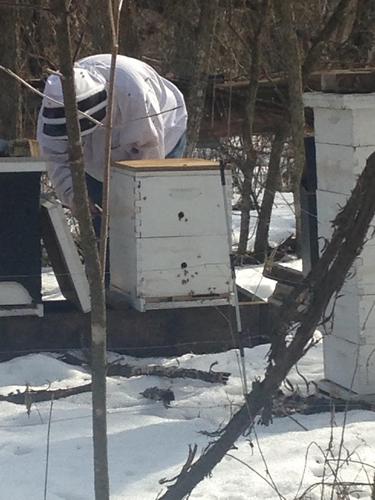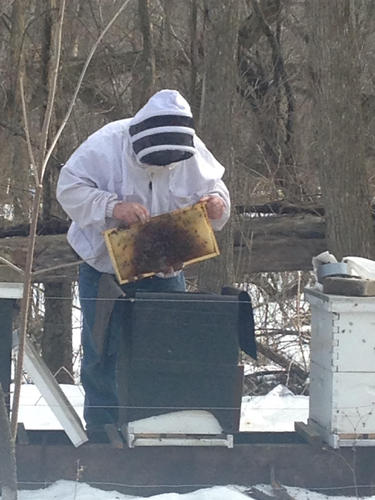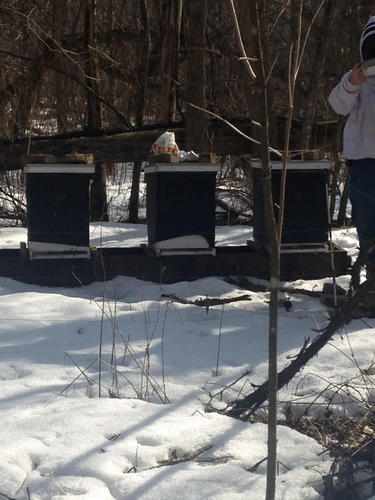Results 241 to 250 of 353
Thread: Beekeeping
-
01-24-2017, 03:48 AM #241
-
01-24-2017, 02:25 PM #242

The last few years, Michelle and the bee club has ordered nucs for new members and those wanting expand, from Long Lane Bee farm. They are, relatively, local to us, which helps in acclimation. They always order enough one of the members takes a trailer over to pick them up.
Last year, we bought out the balance of an apiary from about 120 miles north of us, to expand. I think she has 43 or 45 hives now. A little over half are on our property and the others are scattered around different pumpkin patches.
She enjoys it. It's quiet and the bees don't argue. Both of us have worked in law enforcement for the past 20 years, so the peace and quiet is worth more than $ can buy.
-
01-24-2017, 02:43 PM #243

AcesandEights, Is there a benefit to having the bees near a pumpkin patch?
-
01-24-2017, 03:18 PM #244

Typically native pollinators are better at pumpkins. Here is a quote from a Penn State Cooperative Extension paper.
"Although honeybees are regarded as important pollinators for a wide variety of crops, there are several other bee species that are effective pollinators of pumpkins. Surveys in Maryland, Virginia, and West Virginia have indicated that farms renting honeybees did not have more honeybees working pumpkin flowers than farms that didn’t rent them. Also, compared with bumblebees or squash bees, honeybees start to forage later in the day in the midsummer and are less or not active in inclement weather. In the Northeast U.S., native bees alone can fully pollinate vegetable crops on most farms. Thus, growers may be able to save costs associated with renting honey bee hives by first evaluating the native bee populations before contracting for honeybee colonies."
Here is what you want.
"The most important pumpkin pollinator is the squash bee, a naturalized solitary species that is dependent solely on pollen from pumpkin and squash plants."
http://extension.psu.edu/plants/sust...ollinators.pdf“Hiking’s not for everyone. Notice the wilderness is mostly empty.” ― Sonja Yoerg
-
The Following User Says Thank You to Cincinnatus For This Useful Post:
32t (01-24-2017)
-
01-24-2017, 06:01 PM #245

I know my wife can tell a lot better than I, but.....
Considering the majority or the crops around Illinois is corn and soybean (which are self pollinating), the next largest crop here is pumpkins (which require an external method to pollinate)....that's the main reason why we have them at pumpkin patches. There is a lot of pollen, given the small acreage required to grown pumpkins.
-
01-24-2017, 06:08 PM #246

This is getting way out of my realm of bee knowledge.
Illinois is the largest pumpkin producing state in the US, and every major producer here uses honey bees to pollinate their crop. While the 'smart guys' at the Universities may 'know something better'...the guys with their boots on the ground must be doing something right.
-
01-24-2017, 07:19 PM #247
-
02-01-2017, 03:11 AM #248

Cashed my check today and think I have enough now to order me some bees!

-
02-20-2017, 03:25 AM #249

Checked my bees today.
This hive is doing well

This hive has starved to death.

The one on the left I am worried about and am feeding it some food.

-
The Following User Says Thank You to 32t For This Useful Post:
Hirlau (02-20-2017)
-
02-20-2017, 12:02 PM #250aka shooter74743




- Join Date
- Sep 2009
- Location
- SE Oklahoma/NE Texas
- Posts
- 7,285
- Blog Entries
- 4
Thanked: 1936
They make good honey...I got a taste at Charlie's!
Southeastern Oklahoma/Northeastern Texas helper. Please don't hesitate to contact me.
Thank you and God Bless, Scott
-
The Following User Says Thank You to ScottGoodman For This Useful Post:
32t (02-20-2017)


 651Likes
651Likes LinkBack URL
LinkBack URL About LinkBacks
About LinkBacks











 Reply With Quote
Reply With Quote
